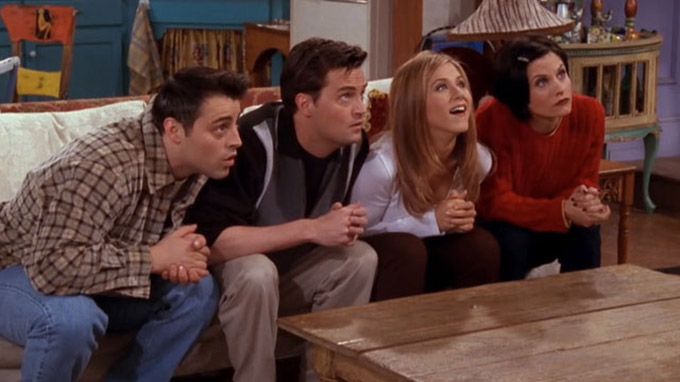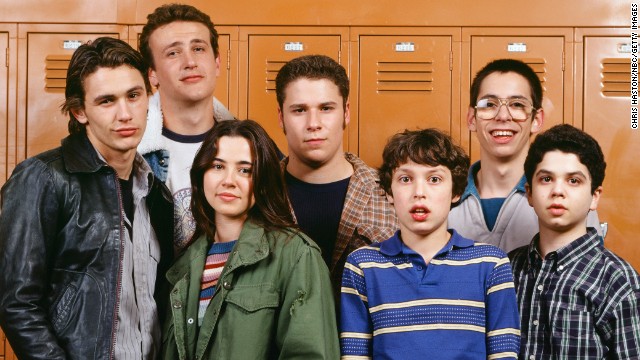One sitcom that chose to devote at least part of an episode to pornography was the popular hit comedy Friends. The pornographic subplot goes something like this: Joey and Chandler are sitting around watching TV, when all of a sudden they come to the "glorious" realization that- for whatever reason- a pornographic channel has been added to their basic TV cable package. Elated by this discovery, the boys basically sit around and watch "free porn" for the entire episode. This has to be a new low in the history of western civilization: humans watching television watching others humans watching pornography on television.
I have a confession to make. When I was around twelve years old, back when HBO was in its heyday, I would try to find the television station that was designated for the network- hoping beyond hope that I could see it through the snow and/or the the twisting and squiggling lines on the scrambled screen. Yes, in those days I had a tremendous curiosity about movies that my parents wouldn't permit me to watch (I know this is shocking). Consequently, when the cable company accidentally gave us HBO for a couple weeks I was extremely excited. As a matter of fact, I even got in trouble one night for getting up around 2AM in order to watch Escape From New York; first, because the title sounded cool, and secondly, and most importantly, because I wanted to watch an "R" rated movie! That was the end of HBO for me.
In any case, while I can remember that adolescent instinct, it's important to note that at the time, I was actually an adolescent! Joey and Chandler have no such excuse as they sit in their Lazy Boys unapologetically watching something far more graphic than anything I could have imagined. So what is our reaction supposed to be to this storyline? Well, according to the show's laugh track, we are supposed to find this behavior hilarious. Yes, the idea that a pair of grown men would sit around engaging in a "pornathon,' while their lady friends are standing around in the background protesting as mildly as possible, is supposed to have us in stitches.
Fortunately there is a definite moral to the story. For throughout the entire episode, Joey and Chandler are compelled to keep the TV on for fear that if they turn it off they will lose all access to the station (or so the their wizened plumber tells them). Nevertheless, by the end of the episode Chandler demonstrates an incredible amount of courage, a bravery that few would even dare entertain when he wonders aloud whether or not he can actually kick the habit and turn the TV off. What happens next may in fact move you to tears...
Obviously the previous statement is meant to be more than a little ironic, for the only reason the writers of the show had Chandler turn off the television is as a comedic device to make us laugh when he turns it right back on again. Indeed, wherever there is any suggestion in the episode that there may be something wrong with watching pornography, the writers immediately turn it into a punchline. Based on the ending, we are left with the distinct impression that watching a little/ a lot of pornography is probably no more harmful than a little bawdy humor among guys.
Usually in these types of shows there is at least some kind of lip service paid to the potential moral dangers involved in watching lurid material. Quite the opposite here- by the end of the episode, the men are practically mocking the very notion that there should be any dilemma at all. They do everything but say: porn is good for you. What is equally bizarre is the fact that the women seem just as unaffected by their perverse behavior. How creepy and weird is that when you think about it? Films that most people wouldn't even want another living soul to know that they watched, are treated here with a kind of shameful serendipity. This sequence of events basically sums up the whole moral worldview of Friends. All sex is permitted (and basically hilarious), so long as it doesn't involve any obvious sexual violence, like getting raped and/or murdered.
Freaks and Geeks is another example of a sitcom willing to bravely go where no other comedy has gone. Sadly, in spite of its huge cult following, Freaks and Geeks ran only one year. Essentially the show is a kind of Wonder Years a decade later (it takes place in the early 80s). What is particularly exceptional about the show is its writing, for it really does capture some of those interesting and profoundly awkward conversations that tend to take place among adolescent youths- and miraculously, it does so without becoming excessively nostalgic or maudlin.
Unlike Chandler and Joey, the kids in the following scenes are in their adolescence, as opposed to being in a perpetual state of it. The episode begins in sex ed class, where their P.E. teacher (who is incidentally played by the notorious Biff character from Back to the Future) is attempting to provide detailed instruction about the female anatomy. The whole thing of course is completely uncomfortable, and it becomes readily apparent in no time that the main character, Sam, knows next to nothing about the female body. As a result of his understandable ignorance, an upperclassman offers to "help" him in these matters. Seeing Sam and his friends in the hall, that "older friend", played by James Franco, approaches them and hands them something hidden under his jacket. It turns out that it is a pornographic film. What ensues next is probably the most creative and accurate portrayal of the reaction of young boys (depending on their experience) when confronted with the reality of such graphic material. And it's not exactly what you might expect:
I recommend watching the first thirty minutes of the episode to get a sense of the whole thing, but if you want to focus on the most important scenes, begin watching at the twenty two minute mark and conclude with the scene in the lunchroom (around the 29 minute mark). I cannot stress enough how accurately the writers capture the way young men respond to such "material". It would have been so predictable for them to take the easy way, either by becoming too moralistic, or by being too flippant, as was the case with the episode of Friends. But instead of taking the easy way, they chose something far more artistic, something far more in keeping with what happens in real life.
And yet the wages of this mistake are spelled out perfectly in the scenes that follow. The more these kids watch the film (especially Sam and Bill) the more their body language tells you everything. So much so that by the time they finish watching they are almost completely turned away from the screen (and least in terms of their body language). And Bill comments, rather poignantly I might add; "Are we going to go to hell for this? I don't want to go to hell." Unprompted by any parental guilt trip, the truth is they just feel physically as well as spiritually disgusted by the whole thing. Indeed, it is quite a humorous statement on the surface (as far as "hell" can be humorous), but at the same time it speaks volumes to the deeper sense of "yuck" that is felt within the soul by the simple act of viewing this smut.
This ultimately helps explain the final scene in the sequence, for the girl that Sam has a crush on approaches his lunch room table and asks him if he would like to help her with some social event. Unable to look her in the eyes, he immediately begins to exhibit the same body language as he did when he was watching the pornographic film. It is as if he cannot even look at her at all. Why is this the case? They do not explain it in the show, but if you understand anything about what that film did their collective psyche, then you realize that after watching it, Sam cannot even begin to look at his beloved without the threat of those terrible images attacking his immaculate image of her.
Eventually, through a series of events, Sam is ultimately able to discuss the issue with his sex ed teacher. Once again, the show chooses subtlety over moralism, wisely preferring not to reveal the actual contents of the conversation, but rather presenting the upshot of the exchange instead. While the details of the conversation are intentionally fuzzy, the teacher presumably tries to explain the larger truth of a healthy sexuality (though the audience is largely left to imagine what that conversation might look like) juxtaposing that with the disgusting, and frankly weird, ideas that were introduced to them through the film. Obviously there is more to say on this subject (like what do you say and do about all of the even more ubiquitous soft-core pornography that is out there), but I would argue that Freaks and Geeks addresses the issue exactly at the level at which it was disposed to do so.
Most important of all, though, unlike the insidious and simplistic implications of the show Friends, Freaks and Geeks really does provide tremendous insight into what pornography does to the human imagination. The man who watches pornography (either hard-core or soft core) will increasingly begin to associate sexuality with some kind of dirty pleasure (as is often portrayed in magazines and in movies), and his partner's body, not with gentleness and affection, but rather as a raw material to filch and plunder. And the body language in this sequence really does represent the kind of contortion of spirit, a physical turning away of man from true intimacy. As one woman whose husband became addicted to pornography described it to me- she truly came to feel as if her husband had a mistress, and when she would ask him why he wouldn't look at her in the same way, he would tell her in earnest; "Oh, I would never look at you that way." The truth is he had so completely destroyed a healthy sense of sexuality, that he genuinely believed that he was complimenting her by telling her this! "I could never see you in such a twisted and perverse way, I love you too much!" Thus, the great tragedy of pornography as expressed in Freaks and Geeks, as well as in this woman's sad confession, is that it really does render a man impotent in the order of intimacy- so much so that he becomes utterly incapable of associating sexuality with anything other than exploitation. Two sitcoms- two very different approaches to pornography.







This comment has been removed by a blog administrator.
ReplyDelete